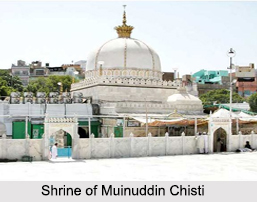 Khwaja Muinuddin Chisti was a famous Sufi Saint who was responsible for introducing the Sufi order in India. In fact the Chishti Order of Sufis, which is now indigenous to India, was the first of the Sufi orders to be introduced in the country sometime in the middle of the 12th century AD. Khwaja Muinuddin Chisti was eighth in the line of succession from the founder of the Chishti Order, Khwaja Abu Ishq Shami Chishti. The devotees of this order practise Chilla i.e. they observe seclusion for forty days during which they refrain from talking beyond what is absolutely necessary, eat little and spend most of their time in prayers and meditation. Another characteristic of the followers of this order is their fondness for devotional music. They hold musical festival, and enter into ecstasy while listening to singing.
Khwaja Muinuddin Chisti was a famous Sufi Saint who was responsible for introducing the Sufi order in India. In fact the Chishti Order of Sufis, which is now indigenous to India, was the first of the Sufi orders to be introduced in the country sometime in the middle of the 12th century AD. Khwaja Muinuddin Chisti was eighth in the line of succession from the founder of the Chishti Order, Khwaja Abu Ishq Shami Chishti. The devotees of this order practise Chilla i.e. they observe seclusion for forty days during which they refrain from talking beyond what is absolutely necessary, eat little and spend most of their time in prayers and meditation. Another characteristic of the followers of this order is their fondness for devotional music. They hold musical festival, and enter into ecstasy while listening to singing.
Khwaja Muinuddin Chisti received his spiritual transmission from Shaikh Ibrahim Qandozi. It is believed that once when Khwaja Muinuddin was watering the plants in his garden he saw Shaikh Ibrahim Qandozi. The very sight of Shaikh Ibrahim Qandozi deeply impressed Muinuddin. He ran out of the garden to receive Shaikh Ibrahim Qandozi and with great respect conducted him into his garden and presented to him some of the best fruits of the garden. Shaikh Ibrahim Qandozi was pleased with Muinuddin`s warm hospitality and his mannerism. He found him to be an eligible candidate to receive his grace and, therefore, transmitted to him his spiritual energy. This sacramental act of `transmission` of spiritual energy was symbolized by an outward act of handing over a piece of bread, which Shaikh Ibrahim first chewed it himself and then gave it to Muinuddin for him to eat. This caused in one moment, a complete and lasting transformation in Muinuddin`s life. Khwaja Muinuddin thereafter sold all that belonged to him and distributed the money so obtained among the poor and needy.
After receiving the spiritual transmission from Shaikh Ibrahim Qandozi and disposing off his worldly possessions, Khwaja Muinuddin took upon the life of a wandering hermit in search of a spiritual guide. Initially, he spent a few years in Samarqand in learning religion and then he moved to Bukhara where he studied the Holy Quran under the guidance of Maulana Hisamuddin Bukhari, a mystic and scholarly person. Khwaja Uthman Haruni, a famous Sufi Saint of the Chishti Order, however, initiated him, in the Chishti Order of Sufis in Harun. After receiving his authorization from his Master to train others in the Order, he was asked to go to India.
It is believed that during his journey to India Khwaja Muinuddin Chishti met many of the renowned saints of his time including Shaikh Abdul Qadir Gilani (the founder of the Qadiri Order), Abu Najib Suhrawardi and his son and successor Shihabuddin, the most renowned Sufi Saint of the Suhurawardi Order, Shaikh Abu Yusuf Hamadani, a great Sufi Master of the Naqshbandi Order, Shaikh Shamsuddin Tabrizi, who was the spiritual master of Maulana Jalaluddin Rumi and Shaikh Nasiruddin, a famous saint. Khwaja Muinuddin first entered in Lahore where he visited the tomb of Shaikh Ali el Hujwiri (Data Ganj Bakhsh) and then from there he proceeded to Ajmer in 1165-66 AD where he finally spent the rest of his life.
Many miracles are associated with Khwaja Muinuddin Chishti. It is said that annoyed with the king of Ajmer, Prithviraj Chauhan, he uttered, `I hand over Prithviraj alive in the hands of King Shihabuddin.` A few days later in 1192 AD, Sultan Shihabuddin Muhammed Ghori conquered Ajmer and captured Prithviraj Chauhan alive. Sultan Muhammed Ghori attributed his victory to the blessing of Khwaja Muinuddin Chishti and in his honour constructed a building in the brief period of two-and-a-half days, which is famous as `Dhai Din Ka Jhopra`. It is also related that Emperor Akbar was blessed with a son in answer to the prayer of a Chishti Sufi, Shaikh Salim, a descendant of the famous Saint Baba Farid. This resulted in Akbar`s devotion to Khwaja Muinuddin Chishti and he started visiting the Dargah of Khwaja Muinuddin Chishti in Ajmer every year and distributing lots of gifts in his honour. He also named his son `Salim` after the saint.
Khwaja Muinuddin Chisti continues to be greatly revered as one of the greatest Sufi Saints of India and his Dargah is visited by many followers and believers alike. His compassion for the poor of caste and creed earned him the epithet of `Garib Nawaz.` His shrine at Ajmer e Sharif is an important place of pilgrimage for Muslims and believers all over the world.



















